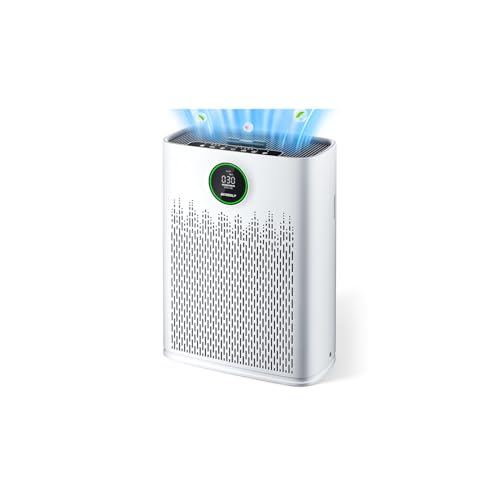Do you suspect you need an air purifier? This simple guide will help you decide.
Clean air is vital for our health and well-being. Sometimes, the air inside our homes can be more polluted than the air outside. Factors like dust, pet dander, smoke, and chemicals can contribute to indoor air pollution. These pollutants can cause allergies, asthma, and other health issues.
Knowing if you need an air purifier can be tricky. This post will highlight signs and reasons that indicate you might benefit from an air purifier. By understanding these signs, you can make an informed decision about improving your indoor air quality. Let’s explore if an air purifier is right for you.
You May Like
- 𝗥𝗘𝗠𝗢𝗩𝗘…
- 𝗛𝗘𝗟𝗣𝗦 𝗠𝗔𝗞𝗘 𝗢𝗗𝗢𝗥𝗦…
- 𝗨𝗦𝗘 𝗜𝗧 𝗔𝗡𝗬𝗪𝗛𝗘𝗥𝗘: With…
- #𝟭 𝗔𝗜𝗥 𝗣𝗨𝗥𝗜𝗙𝗜𝗘𝗥…
- 【360° High Efficient Purification】 : Note: The power…
- 【Upgraded H14 True HEPA Purifier 】 : The VNIUP ZQA-4000C…
- 【3 Timer& 3 Fan Speed 】 : The home hepa air purifier has…
- 【 Sleep Mode & Nightlight 】 : With an advanced motor and…
- WHY CHOOSE AHAM VERIFIDE AIR PURIFIERS: AHAM (Association of…
- HIGH-PERFORMANCE AIR PURIFICATION: A powerful 56W…
- AHAM VERIFIDE, PROVEN PERFORMANCE: AHAM VERIFIDE with a CADR…
- GENUINE REPLACEMENT FILTERS: For the best performance and…
- Air Quality Monitoring: This air purifier is designed with a…
- Remarkable Filtration: Featuring an advanced filtration…
- 3-Stage Advanced Filtration: Our air filter combines a…
- User-Friendly Design: ECOSELF air purifiers for large room…
- 【𝟐𝐗 𝐏𝐨𝐰𝐞𝐫…
- 【𝐈𝐧𝐭𝐞𝐥𝐥𝐢𝐠𝐞𝐧𝐭…
- 【𝐐𝐮𝐢𝐞𝐭 & 𝐀𝐫𝐨𝐦𝐚 𝐟𝐨𝐫…
- 【𝐒𝐦𝐚𝐫𝐭 𝐀𝐢𝐫 𝐂𝐚𝐫𝐞 &…
Signs Of Poor Indoor Air Quality
Persistent allergies, frequent headaches, and a musty smell are signs of poor indoor air quality. Consider an air purifier to breathe easier.
Frequent Allergies
Allergies that happen often can mean poor air quality. Sneezing and coughing are common signs. Watery eyes and runny nose may also occur. Dust and pollen can make these symptoms worse.
Persistent Odors
Bad smells that never go away can be a sign. Cooking smells or pet odors might linger longer. Mold and mildew can also cause smells. It may mean the air is not fresh.

Credit: www.iqair.com
Common Pollutants In Homes
Dust, pet dander, and mold spores are common pollutants in homes. An air purifier can help if you notice allergies or asthma symptoms. Clean air improves health and comfort.
Dust And Pollen
Dust and pollen can make breathing hard. They come from many sources. Open windows let in pollen. Dust gathers on furniture and floors. Cleaning helps but doesn’t remove all. An air purifier can help. It catches tiny particles. Keeps the air clean.
Pet Dander
Pet dander is small bits of skin. Cats and dogs shed it. It floats in the air. Causes allergies for many people. An air purifier can reduce pet dander. Makes breathing easier. Keeps your home healthier.
Health Symptoms To Watch For
Persistent allergies, frequent headaches, or a constant stuffy nose may signal the need for an air purifier. These symptoms often indicate poor indoor air quality. Improving air can help ease these health issues.
Respiratory Issues
Struggling with breathing can be a sign. Coughing and sneezing often is another. These issues may mean poor air quality. Air purifiers can help reduce these symptoms. Clean air is important for your lungs. Breathing easier is the goal.
Skin Irritations
Itchy skin may be more than dry weather. Rashes and redness could be linked to the air. Dust and allergens in the air can cause skin problems. Air purifiers remove these particles. Clearer skin can be a result. Healthy skin feels better.
Environmental Factors
Living in a city can increase exposure to pollutants. Heavy traffic, construction, and dense population contribute to poor air quality. This can cause breathing issues and allergies.
Factories often release harmful chemicals. These can enter homes through windows and doors. Even small amounts can affect health over time.
Household Indicators
Have you noticed a lot of dust on furniture? This is a sign. Dust can make it hard to breathe. An air purifier can help reduce dust. It keeps the air clean and fresh. This can help you breathe easier.
Mold in your home can be harmful. It can cause allergies. Mold likes damp places. An air purifier can filter out mold spores. This can improve the air quality. It can help prevent health issues.
Benefits Of Air Purifiers
Air purifiers can help remove dust, pollen, and pet dander. They can also reduce smoke and odor. These devices can trap small particles. This makes the air cleaner to breathe. Cleaner air can reduce allergies. It can also help those with asthma.
Clean air can help you sleep better. It reduces irritants in the air. This means less sneezing and coughing. Better air quality can help you breathe easier. This can lead to a more restful sleep. You will wake up feeling more refreshed.
Types Of Air Purifiers
HEPA filters trap tiny particles from the air. They catch dust, pollen, and pet dander. These filters can remove 99.97% of particles larger than 0.3 microns. Perfect for homes with allergies or asthma.
Activated carbon filters absorb bad smells and gases. They are effective at removing smoke, fumes, and cooking odors. These filters work well in kitchens and places with strong smells.

Credit: www.simpurelife.com
Choosing The Right Air Purifier
Indoor air quality can impact your health. Unusual odors, allergy symptoms, or dust buildup may signal the need for an air purifier. Recognizing these signs ensures cleaner air and a healthier home environment.
Room Size
First, measure the room size. Air purifiers work best in rooms they are designed for. Small rooms need small air purifiers. Large rooms need larger ones. Check the square footage on the box. This tells you what room size the purifier can handle. If the room is too big, the purifier won’t work well.
Specific Needs
Think about your specific needs. Do you have allergies? Some purifiers are great for pollen. Do you have pets? Some purifiers handle pet dander. Smoke or cooking odors? Choose a purifier with a carbon filter. This helps with smells. Different purifiers help with different problems. Choose one that meets your needs.
Frequently Asked Questions
What Are The Signs You Need An Air Purifier?
Common signs include allergies, asthma, unpleasant odors, and visible dust. Air purifiers can improve air quality.
How Do Air Purifiers Help With Allergies?
Air purifiers remove allergens like pollen, dust, and pet dander. This reduces allergy symptoms and improves health.
Can An Air Purifier Eliminate Bad Odors?
Yes, air purifiers with activated carbon filters can effectively remove bad odors from the air.
Do Air Purifiers Help With Asthma?
Air purifiers reduce airborne irritants that can trigger asthma attacks. This makes the air cleaner and safer.
Conclusion
An air purifier can improve your indoor air quality. Notice dust, pollen, or pet dander around? You might need one. Feeling allergies or asthma? Clean air can help. Pay attention to odors too. Fresh air means a healthier home. Consider your environment and needs.
An air purifier might be the solution. Make your living space more comfortable. Breathe better, live better. Evaluate your air today. Make an informed choice. Your health matters.





